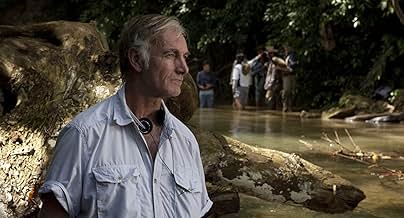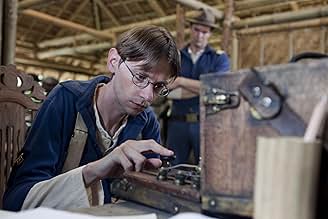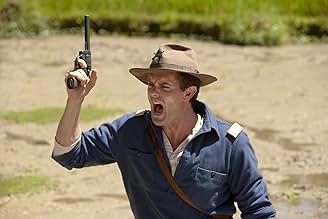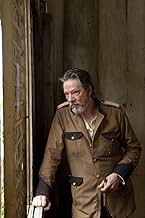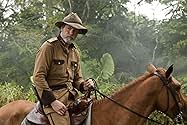Aggiungi una trama nella tua linguaA fictional account of events during the Philippine-American War.A fictional account of events during the Philippine-American War.A fictional account of events during the Philippine-American War.
- Regia
- Sceneggiatura
- Star
- Premi
- 1 vittoria e 9 candidature totali
Hoffman Cheng
- Chop-Chop
- (as Sai Ho Cheng)
Reymart Colestines
- Malpulgas
- (as Raymart Colestines)
Miguel Faustmann
- Captan Narvaez
- (as Miguel Faustman)
Recensioni in evidenza
10kaljic
Amigo is a fine film that should have gotten more traction at the box office. Its fictional portrayal of real historical events was a little too much, I think, for the average movie-goer in 2010, when it was released and when the Iraqi War in the Middle East was raging.
At the turn of the last century, Spain ceded the Philippines to the United States as a result of the Spanish-American War. This movie shows what the concession looked like on an everyday level. Spanish occupation of the Philippines had not been without incident, but the Spanish rule had been more geared to letting the local populations retain some element of self-rule. Self-rule went out the window when the Americans took over, symbolized by the conflict of the upper echelon office convincingly played by Chris Cooper, and everyone else.
Amigo has high production values, depicting fully formed, full dimensional characters. Some of the characters really stand out. Prominent is the priest, played by Yul Vasquez. The extent to which this character deliberately misinterprets whatever is being said by the local population which he secretly holds in such contempt to the Americans is truly breath-taking. It goes over the top at times, but not by much. The Filipino community is seen to be very close-knit but with volatile characters. The American foot soldiers are shown as young, inexperienced, uneducated rookies from the sticks, their lieutenant as a conflicted army officer trying to achieve a balance between American objectives and letting the local population rule themselves, and the commanding officer a hardened scrapper. Amigo shows the many many ways in which an invasion between two very different cultures can go wrong.
As far as I can tell Amigo has never been released on DVD, which is really too bad. It is a fine film which deserves to be seen.
At the turn of the last century, Spain ceded the Philippines to the United States as a result of the Spanish-American War. This movie shows what the concession looked like on an everyday level. Spanish occupation of the Philippines had not been without incident, but the Spanish rule had been more geared to letting the local populations retain some element of self-rule. Self-rule went out the window when the Americans took over, symbolized by the conflict of the upper echelon office convincingly played by Chris Cooper, and everyone else.
Amigo has high production values, depicting fully formed, full dimensional characters. Some of the characters really stand out. Prominent is the priest, played by Yul Vasquez. The extent to which this character deliberately misinterprets whatever is being said by the local population which he secretly holds in such contempt to the Americans is truly breath-taking. It goes over the top at times, but not by much. The Filipino community is seen to be very close-knit but with volatile characters. The American foot soldiers are shown as young, inexperienced, uneducated rookies from the sticks, their lieutenant as a conflicted army officer trying to achieve a balance between American objectives and letting the local population rule themselves, and the commanding officer a hardened scrapper. Amigo shows the many many ways in which an invasion between two very different cultures can go wrong.
As far as I can tell Amigo has never been released on DVD, which is really too bad. It is a fine film which deserves to be seen.
I saw this movie at the film festival Copenhagen Pix on April 28 and I was pleasantly surprised as the movie is a return to form for John Sayles after the disappointing Honeydripper.
I should explain that back in my college days I wrote my thesis on John Sayles so I'm obviously a big fan and have watched most of his movies at least five times. Lone Star, Matewan and City of Hope (the movies my thesis was based on) I have watched more than 50 times. I also met John Sayles a few years ago in Copenhagen and he was as pleasant as I had expected. When I told him that I'd written about him, he asked what the title was and upon hearing the academic mumble-jumble title (I forget) he just replied, "Yup, that'll work," and proceeded to talk about baseball and sports in general (upon hearing that I was writing about sports). Great experience to talk to him and I still consider Lone Star one of the five best movies I have ever seen.
Anyway, back to the review. All in all Amigo is an excellent movie. Sayles' social conscience makes him a rather special and unique American director and if you don't know his movies you should get cracking. There are almost no bad movies in his work. Amigo is well-cast and all the actors do a great job especially when you consider how close to Sayles' words they have to stick (Sayles may be a cool and laid-back guy but he is not a big fan of his actors improvising a whole lot) it all comes out so effortlessly. Obviously, it helps that the dialogue, as always, is brilliant.
The first entry here on IMDb about this movie from usherontheaisle explains the plot better than I possibly could. As usual, Sayles is very balanced on the subject matters and he never takes the easy way out of any dilemma. The natives and their motives are likable but so are the soldiers and the rebels. Sayles explains in details the dilemmas of each group so that the audience understands everything from the perspective of each group. There are a tremendous number of characters that have a quite substantial part in the movie, another Sayles trademark, and this works well to get all the angles of the story exposed. This does require the audience to pay attention because sometimes a character will not be present for 30 minutes and then Sayles returns to him/her. Sayles is usually very ambitious in his movies' scope and Amigo is definitely no exception. He packs in so many facts in his dialogue and narrative that you sometimes feel you have been exposed to a history lesson while being entertained.
The movie is gloomy and you have a feeling right from the beginning that it will end badly. Sayles is always rather pessimistic in his views on humanity and human behaviour – Men with Guns comes to mind – but he hardly ever blames anyone and that is also the case in Amigo. Even the sneaky Spanish preacher eventually shows his good side at the end of the movie. This is Sayles' way and if you read his books you will see that he writes in the same style.
Sayles' character direction has always been amazing – how he gets so many unknown actors to perform so damn well I'll never know – and Amigo is no exception. The amazing and underrated Chris Cooper does a fine, small job as old school Colonel Hardacre ("Them gloves are coming off!") and so does Garret Dillahunt as Lt. Compton. But it is almost not fair to mention anyone as everyone of the actors are convincing and very capable.
I realize that this does look a bit like a fanboy review but bear in mind that I really did not like Sayles' last movie, Honeydripper and I was not too thrilled about Casa de los Babys either. In my opinion this is Sayles' best movie since Lone Star. It is a bit on the heavy side at times and it does require a lot from the audience but there is a big return on that investment. Go see it. It's (almost) Sayles at his best.
I should explain that back in my college days I wrote my thesis on John Sayles so I'm obviously a big fan and have watched most of his movies at least five times. Lone Star, Matewan and City of Hope (the movies my thesis was based on) I have watched more than 50 times. I also met John Sayles a few years ago in Copenhagen and he was as pleasant as I had expected. When I told him that I'd written about him, he asked what the title was and upon hearing the academic mumble-jumble title (I forget) he just replied, "Yup, that'll work," and proceeded to talk about baseball and sports in general (upon hearing that I was writing about sports). Great experience to talk to him and I still consider Lone Star one of the five best movies I have ever seen.
Anyway, back to the review. All in all Amigo is an excellent movie. Sayles' social conscience makes him a rather special and unique American director and if you don't know his movies you should get cracking. There are almost no bad movies in his work. Amigo is well-cast and all the actors do a great job especially when you consider how close to Sayles' words they have to stick (Sayles may be a cool and laid-back guy but he is not a big fan of his actors improvising a whole lot) it all comes out so effortlessly. Obviously, it helps that the dialogue, as always, is brilliant.
The first entry here on IMDb about this movie from usherontheaisle explains the plot better than I possibly could. As usual, Sayles is very balanced on the subject matters and he never takes the easy way out of any dilemma. The natives and their motives are likable but so are the soldiers and the rebels. Sayles explains in details the dilemmas of each group so that the audience understands everything from the perspective of each group. There are a tremendous number of characters that have a quite substantial part in the movie, another Sayles trademark, and this works well to get all the angles of the story exposed. This does require the audience to pay attention because sometimes a character will not be present for 30 minutes and then Sayles returns to him/her. Sayles is usually very ambitious in his movies' scope and Amigo is definitely no exception. He packs in so many facts in his dialogue and narrative that you sometimes feel you have been exposed to a history lesson while being entertained.
The movie is gloomy and you have a feeling right from the beginning that it will end badly. Sayles is always rather pessimistic in his views on humanity and human behaviour – Men with Guns comes to mind – but he hardly ever blames anyone and that is also the case in Amigo. Even the sneaky Spanish preacher eventually shows his good side at the end of the movie. This is Sayles' way and if you read his books you will see that he writes in the same style.
Sayles' character direction has always been amazing – how he gets so many unknown actors to perform so damn well I'll never know – and Amigo is no exception. The amazing and underrated Chris Cooper does a fine, small job as old school Colonel Hardacre ("Them gloves are coming off!") and so does Garret Dillahunt as Lt. Compton. But it is almost not fair to mention anyone as everyone of the actors are convincing and very capable.
I realize that this does look a bit like a fanboy review but bear in mind that I really did not like Sayles' last movie, Honeydripper and I was not too thrilled about Casa de los Babys either. In my opinion this is Sayles' best movie since Lone Star. It is a bit on the heavy side at times and it does require a lot from the audience but there is a big return on that investment. Go see it. It's (almost) Sayles at his best.
Without a doubt, a movie about this subject needed to be made. The parallels with America's wars with Vietnam and Iraq are endless, and the Philippines' history as the strategic spoils for foreign occupiers needs to be told. This movie did an okay job of depicting the arrogance of imperialism as well as the misery of those who want peace. However, I think the time limitation of a feature length movie hampers any real character development. The Americans' are haughty and racist caricatures, and the conflicts within the Filipino families are not as palpable as they should be. Also, important strategic events of the war are merely alluded to off-screen.
Throughout the whole movie, I couldn't help but feel the story would have been more suited to a TV-miniseries format. Such a format would have allowed ample time for character development and action scenes.
Throughout the whole movie, I couldn't help but feel the story would have been more suited to a TV-miniseries format. Such a format would have allowed ample time for character development and action scenes.
Being an American, I have taken my fair share of history courses and studied many of the wars America has been in ever since it's formation and eventual birth in 1776. Just like everyone else, I leaned about Francis Scott Keys and the thirteen original colonies, but above all that, I also learned about the many events and politics which led to our independence. In school, they teach us about WWI and WWII as well as The Civil War, The revolution, the French and Indian War, etc etc. However, as history is so big and vast it well comes down to the perspective of how it is written and how one receives it.
John Sayles has taken on an incredible project. He has done something only one other filmmaker has done, and portrayed all his characters and events in a very different perspective. I say we learn about all the big wars and we always root for America, but Sayles brings to the big screen something that even today we hold in contention, which is the right for one country to invade another. The Philippine-American war is something any American can say they've never heard of (for the most part). It is a part of history America never looks back at, and there are reasons why. Sayles chooses to show America as the invader; the people who don't belong in the situation at hand (such as the War in Iraq), and it is a very intriguing perspective.
The story focuses on a small garrison of American soldiers who have taken post at a small baryo in the Philippines. We're introduced to a whole array of characters with very solid acting behind them all. There are great turns by DJ Qualls, Dane DeHann, Lucas Neff, and Brian Lee Franklin supported by the promising Garrett Dillahunt and always wonderful Chris Cooper. But above them all Joel Torre steals the show as the main character, Rafael, who is also what the title refers too.
Sayles masterfully crafts scene after scene and leads us through a captivating story. Throughout the film, Sayles makes us wonder, "Who is right?" or "What if both sides are right?", while there is a heavy wondering of God and if doing what God says justifies your actions. But then, what about personal choice or following your heart? Between Rafael and his rebellious son, there is a rift. His son helps the colonials, while Rafael is restricted to do what he wishes and must follow the American law that resides.
This is a film I recommend to all who enjoy the 'forgotten' parts of history. What Sayles has done here is another remarkable job of writing and directing while also serving another very unique perspective to the events which happened during the Philippine- American War. It's wonderful storytelling that leads to another well-crafted and haunting John Sayles-esque ending.
John Sayles has taken on an incredible project. He has done something only one other filmmaker has done, and portrayed all his characters and events in a very different perspective. I say we learn about all the big wars and we always root for America, but Sayles brings to the big screen something that even today we hold in contention, which is the right for one country to invade another. The Philippine-American war is something any American can say they've never heard of (for the most part). It is a part of history America never looks back at, and there are reasons why. Sayles chooses to show America as the invader; the people who don't belong in the situation at hand (such as the War in Iraq), and it is a very intriguing perspective.
The story focuses on a small garrison of American soldiers who have taken post at a small baryo in the Philippines. We're introduced to a whole array of characters with very solid acting behind them all. There are great turns by DJ Qualls, Dane DeHann, Lucas Neff, and Brian Lee Franklin supported by the promising Garrett Dillahunt and always wonderful Chris Cooper. But above them all Joel Torre steals the show as the main character, Rafael, who is also what the title refers too.
Sayles masterfully crafts scene after scene and leads us through a captivating story. Throughout the film, Sayles makes us wonder, "Who is right?" or "What if both sides are right?", while there is a heavy wondering of God and if doing what God says justifies your actions. But then, what about personal choice or following your heart? Between Rafael and his rebellious son, there is a rift. His son helps the colonials, while Rafael is restricted to do what he wishes and must follow the American law that resides.
This is a film I recommend to all who enjoy the 'forgotten' parts of history. What Sayles has done here is another remarkable job of writing and directing while also serving another very unique perspective to the events which happened during the Philippine- American War. It's wonderful storytelling that leads to another well-crafted and haunting John Sayles-esque ending.
It is always difficult to tackle a war on film equally and fairly. Each side has its own interests to protect and uphold. Everyone regards the other as an enemy against them. There will be losses from all sides, direct and collateral. Yet, in the end, no one really wins. In "Amigo" by veteran director John Sayles, attempts to show all sides of a multi- dimensional conflict that was the Philippine-American War.
The film brings us back to the turn of the previous century, 1900, when Spain just ceded the Philippines to the USA. A group of young American soldiers under former architect Lt. Compton (Garrett Dillahunt) take control of a remote village called San Isidro. Trying to maintain some semblance of normalcy in his hostaged neighborhood was the barrio captain Rafael Dacanay (Joel Torre). There was also the Spanish friar Padre Hidalgo who continues his churchly mission, while interpreting for the Americans. On the other front, we have the Filipino revolutionaries who camp out in the jungle, led by Rafael's brother Simon (Ronnie Lazaro).
So we can see here a complicated web of intersecting conflicts that Sayles weaved for us. This was presented in a way that the audience can see the way each of these groups thought. The dialog went from English to Tagalog to Spanish and the occasional Chinese, so everything was seemingly told "in their own words." It will be very interesting how this movie will be viewed by audiences represented by the involved parties. While the story had a slow progression at the start, by the time it reached the climactic scenes, the suspense and tension was electric. The ending though was a bit awkward in my opinion. But definitely, the audience, especially the Filipinos, will identify with the conflicts within the tragic character of Rafael, who was caught between keeping the peace in his barrio, and his brother's cause for Filipino independence.
Joel Torre properly captures Rafael's essence and plays him with fervor and passion. Of course, with all the rather hammy acting of the unknown foreign actors behind them, the talent of Torre and the rest of the veteran Filipino cast (notably Rio Locsin as Rafael's religious wife) shone right through. The one known American actor Chris Cooper was in a one-dimensional villain role as a war freak American colonel. As the friar, Yul Vasquez seemed to be more American than Spanish, as he even had a forced Spanish accent. But I do congratulate him for his very good Tagalog speaking. I'm not very sure if it is an error, but I noted the Chinese characters (who were apparently there for comic relief) were speaking in Cantonese, but the predominant Chinese dialect in the Philippines should be Fukienese.
Overall though, this is a very good and thoughtful film about a war that had not been tackled before in Hollywood before. To his credit, American John Sayles directed this movie as if he was a true Filipino. He was successful in telling us his story from the Filipino point of view. He was even able to inject some vignettes of Filipino rural culture with scenes of a fiesta, a funeral and cockfighting. Filipinos should really go out and support this unique motion picture.
The film brings us back to the turn of the previous century, 1900, when Spain just ceded the Philippines to the USA. A group of young American soldiers under former architect Lt. Compton (Garrett Dillahunt) take control of a remote village called San Isidro. Trying to maintain some semblance of normalcy in his hostaged neighborhood was the barrio captain Rafael Dacanay (Joel Torre). There was also the Spanish friar Padre Hidalgo who continues his churchly mission, while interpreting for the Americans. On the other front, we have the Filipino revolutionaries who camp out in the jungle, led by Rafael's brother Simon (Ronnie Lazaro).
So we can see here a complicated web of intersecting conflicts that Sayles weaved for us. This was presented in a way that the audience can see the way each of these groups thought. The dialog went from English to Tagalog to Spanish and the occasional Chinese, so everything was seemingly told "in their own words." It will be very interesting how this movie will be viewed by audiences represented by the involved parties. While the story had a slow progression at the start, by the time it reached the climactic scenes, the suspense and tension was electric. The ending though was a bit awkward in my opinion. But definitely, the audience, especially the Filipinos, will identify with the conflicts within the tragic character of Rafael, who was caught between keeping the peace in his barrio, and his brother's cause for Filipino independence.
Joel Torre properly captures Rafael's essence and plays him with fervor and passion. Of course, with all the rather hammy acting of the unknown foreign actors behind them, the talent of Torre and the rest of the veteran Filipino cast (notably Rio Locsin as Rafael's religious wife) shone right through. The one known American actor Chris Cooper was in a one-dimensional villain role as a war freak American colonel. As the friar, Yul Vasquez seemed to be more American than Spanish, as he even had a forced Spanish accent. But I do congratulate him for his very good Tagalog speaking. I'm not very sure if it is an error, but I noted the Chinese characters (who were apparently there for comic relief) were speaking in Cantonese, but the predominant Chinese dialect in the Philippines should be Fukienese.
Overall though, this is a very good and thoughtful film about a war that had not been tackled before in Hollywood before. To his credit, American John Sayles directed this movie as if he was a true Filipino. He was successful in telling us his story from the Filipino point of view. He was even able to inject some vignettes of Filipino rural culture with scenes of a fiesta, a funeral and cockfighting. Filipinos should really go out and support this unique motion picture.
Lo sapevi?
- QuizBefore Amigo, the last movie about American forces in the Philippines was John Dahl-directed The Great Raid - Un pugno di eroi (2005) which tackled World War II in the Philippines. Also in that movie was Bembol Roco who also appears in Amigo. Also in The Great Raid - Un pugno di eroi (2005) was Cesar Montano who, just like Joel Torre, also plays Jose Rizal in José Rizal (1998).
- ConnessioniFeatured in Bottomline: John Sayles (2011)
- Colonne sonoreKundiman of 1896 (Jocelynang Baliwag)
Traditional
Arranged and performed by Raul Manikan
Daring Music/Administered by Universal Music Corp./ASCAP
I più visti
Accedi per valutare e creare un elenco di titoli salvati per ottenere consigli personalizzati
- How long is Amigo?Powered by Alexa
Dettagli
- Data di uscita
- Paesi di origine
- Siti ufficiali
- Lingue
- Celebre anche come
- Baryo
- Luoghi delle riprese
- Aziende produttrici
- Vedi altri crediti dell’azienda su IMDbPro
Botteghino
- Budget
- 1.500.000 USD (previsto)
- Lordo Stati Uniti e Canada
- 184.705 USD
- Fine settimana di apertura Stati Uniti e Canada
- 37.324 USD
- 21 ago 2011
- Lordo in tutto il mondo
- 184.705 USD
- Tempo di esecuzione2 ore 4 minuti
- Colore
Contribuisci a questa pagina
Suggerisci una modifica o aggiungi i contenuti mancanti



